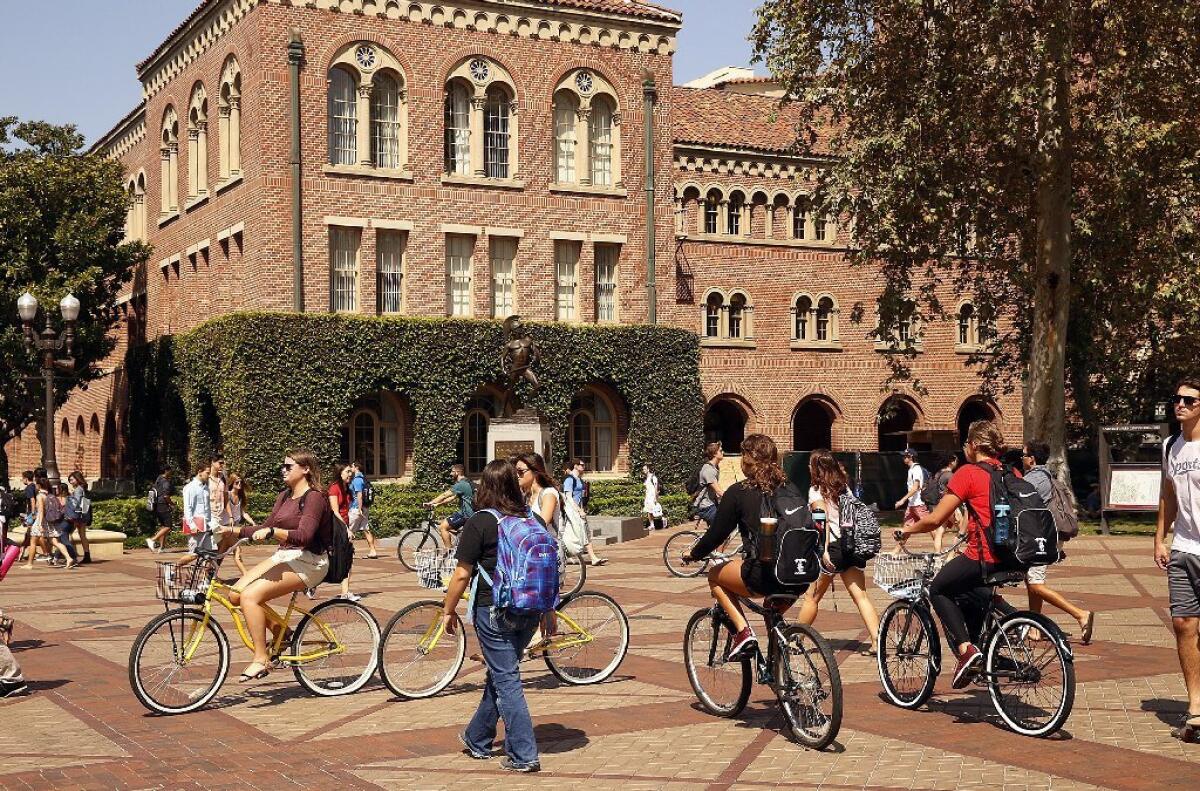USC closes in on $6-billion fundraising goal ahead of schedule

- Share via
USC is about to reach its $6-billion fundraising goal more than 17 months ahead of schedule and will be extending the campaign five more years, university President C.L. Max Nikias announced Wednesday during his annual address to the faculty.
The momentum has helped USC grow much faster than expected, he said. When the effort was announced in 2011, it was considered the largest fundraising goal in American academia.
“The university continues to set new ambitions in the sciences, engineering and medicine, as well as the arts and humanities, while working to expand access for lower- and middle-income students,” Nikias said.
Compared with other research universities of its size, USC has a relatively small endowment.
But in the last 6½ years, USC has raised as much as it had during the prior 6½ decades combined, officials said. The funding has expanded USC’s work in education, research, patient care, the arts and community outreach, and has helped the university recruit nationally recognized faculty and research projects.
What do you do with $6 billion?
Half of the money will be used to increase the university’s endowment, which has grown to more than $4.6 billion, according to USC’s latest financial report. The rest would go toward new buildings and labs and expanding research.
So far, the money has created 100 new faculty positions, endowed 19 new research centers and institutions, and more than doubled USC’s financial aid pool to $330 million annually.
USC has expanded by 4.7 million square feet since 2010, and $1 billion of the money has been designated for building projects. One major project is a new 15-acre “village” that will include shops and eight residential colleges.
How did USC raise so much money so fast?
With the help of a fundraising team of 470 people — which has more than doubled since the campaign began. The team meets with leaders of foundations and corporations that support higher education and social issues. Some focus on identifying key potential donors and building individual relationships with philanthropists; others arrange for university leaders to fly around the globe to make the pitches in person.
USC spends about nine cents to raise each gift dollar, which is relatively low, said Albert Checcio, USC’s senior vice president of university advancement.
Who has given so far?
More than 322,000 people have donated to the campaign. About 64% of total donations came from from non-alumni, Checcio said. Alumni giving totaled $2.2 billion, and parents gave $1.9 billion.
About 500 people donated $1 million or more. Five gave over $100 million. This includes a $200-million donation from Oracle founder Larry Ellison, though he didn’t attend USC. He is funding a cancer research center because of a relationship he developed with a USC doctor who treated his nephew and other close friends, including Apple founder Steve Jobs.
Major endowment gifts also led to the renaming of four schools: the Dana and David Dornsife College of Letters, Arts and Sciences; the Sol Price School of Public Policy; the Glorya Kaufman School of Dance; and the Suzanne Dworak-Peck School of Social Work.
Other major gifts named Keck Medicine of USC and Keck Medical Center of USC and created programs such as the Jimmy Iovine and Andre Young Academy for Arts, Technology and the Business of Innovation.
About 280,000 donors gave $1,000 or less.
“Although USC’s larger gifts tend to make the news, it’s the outpouring of support from alumni, parents, grateful patients and friends from all across the nation and world that is most inspiring,” Checcio said.
What’s next?
USC has raised about $5.9 billion, and Checcio expects to officially hit $6 billion in about four to six weeks. Looking ahead, fundraising efforts will focus on medical research, the arts and increasing the university’s endowment for scholarships.
Why is fundraising so important?
The answer is simple, Nikias said: “Our ambitious vision for USC’s academic future far exceeded our ability to pay for it.”
Under Nikias and his predecessor, Steven Sample, USC has upped its admissions selectivity and academic rankings. Increased funding has lured top faculty away from such places as UCLA and Yale University, and helped attract students from around the globe. In two decades, USC has climbed from 51st to 23rd in U.S. News & World Report’s annual ranking of national universities.
USC’s annual fundraising has more than tripled since the campaign began, averaging $908 million in gifts and pledges — compared with $284 million before 2011.
USC knows it needs to grow its relatively small endowment of $4.6 billion. (By comparison, Harvard’s endowment, the nation’s largest, was reported at $35.7 billion last year. Stanford, as of August 2015, had $22.2 billion.) Income from endowments helps support salaries and scholarships.
“The only way we can sustain for the long haul all the academic gains we have made at the university is by building the endowment,” Nikias has said. “We are not going to be taken seriously by our private peers unless we get our endowment in the top tier.”
To read the article in Spanish, clic here
Follow @RosannaXia for more education news
More to Read
Sign up for Essential California
The most important California stories and recommendations in your inbox every morning.
You may occasionally receive promotional content from the Los Angeles Times.











